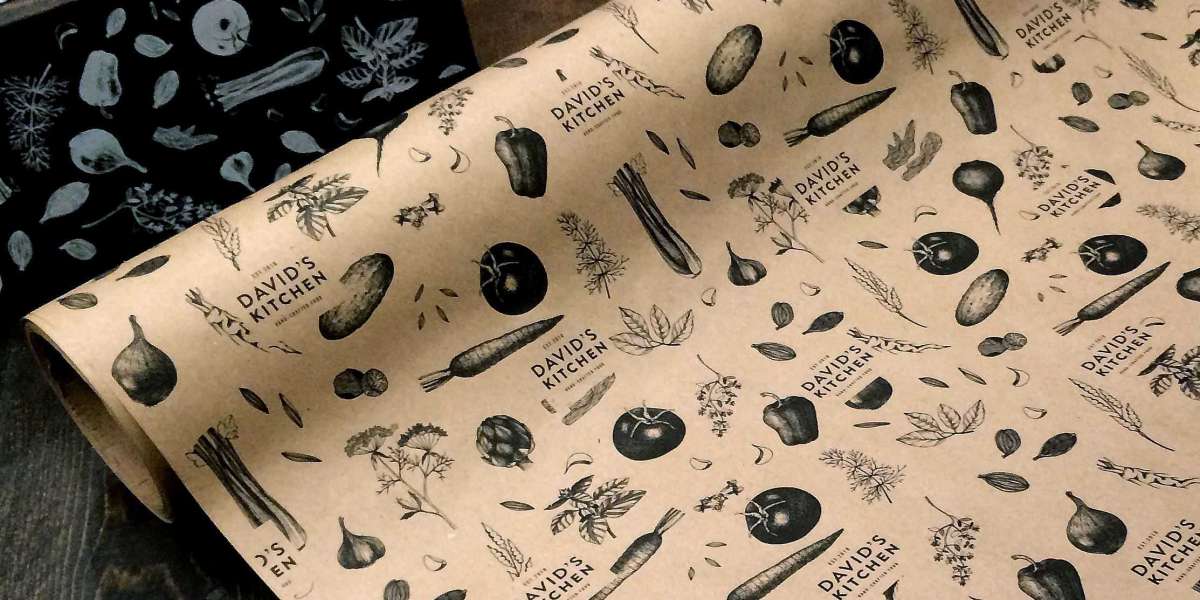Introduction
Greaseproof papers and custom butcher paper are indispensable tools in the food service and retail industries, offering unique properties ideal for various applications. Whether for wrapping meats, lining baking sheets, or creating an aesthetic presentation for foods, these specialized papers provide essential functions with customizable options to meet diverse needs. This article explores the differences, benefits, and sustainable aspects of greaseproof and custom butcher papers, providing insights for businesses and consumers alike.
What is Greaseproof Paper?
Greaseproof paper is a type of specialty paper treated to resist grease, making it ideal for wrapping greasy foods or lining baking trays. Used widely in the food service industry, greaseproof paper ensures that oils don’t seep through, preserving the presentation and hygiene of foods like pastries, fries, and deli items.
The History of Greaseproof Papers
Originally created in the early 20th century as a solution to the messiness associated with greasy foods, greaseproof papers have evolved over the decades to meet modern health and environmental standards. Today, they come in various designs and thicknesses, meeting both functional and aesthetic needs.
How Greaseproof Paper is Made
Greaseproof paper is produced through a process known as supercalendering, which involves compressing the paper to close its pores, creating a smooth, non-porous surface that resists grease. Some papers are also treated with biodegradable or natural waxes for additional moisture resistance.
Types of Greaseproof Paper
Greaseproof paper comes in various types, such as unbleached, bleached, wax-coated, and printed. Each type is designed for specific uses: unbleached for eco-friendliness, wax-coated for added durability, and printed for branding.
Applications of Greaseproof Paper in the Food Industry
From bakeries to fast-food restaurants, greaseproof paper is a go-to for packaging greasy foods, lining baking trays, and providing a layer between food and packaging to maintain hygiene and visual appeal.
Benefits of Using Greaseproof Paper
Greaseproof paper offers several benefits, including resistance to oils, maintaining hygiene, and providing a premium presentation. It’s a versatile choice for businesses seeking quality and sustainability in their packaging.
What is Custom Butcher Paper?
Custom butcher paper is a durable, versatile paper commonly used for wrapping meats. With the ability to withstand moisture and provide adequate breathability for raw meats, custom butcher paper is ideal for butchers, supermarkets, and delis looking to brand their packaging with custom prints.
Common Uses of Custom Butcher Paper
Custom butcher paper has a range of applications beyond wrapping meats. It’s also used in arts and crafts, food service presentations, and as an eco-friendly alternative to plastic wraps.
Differences Between Greaseproof Paper and Custom Butcher Paper
While greaseproof paper is specifically designed to resist grease, butcher paper is crafted to handle moisture while allowing meats to breathe. These distinctions make each paper suitable for different food service applications.
Importance of Customization in Butcher Paper
Customization allows businesses to print logos, messages, and designs on butcher paper, enhancing branding and making the packaging a memorable part of the consumer experience.
Environmental Impact and Sustainability of Greaseproof and Butcher Papers
Both greaseproof and butcher papers have options for eco-friendliness, including biodegradable materials and recycled options. Choosing sustainable papers can help reduce the environmental impact of food packaging.
Choosing the Right Paper for Your Needs
Selecting the right paper depends on several factors, including the type of food, desired presentation, and branding needs. Understanding these aspects can help businesses make cost-effective and functional choices.
Industry Trends for Greaseproof and Custom Butcher Papers
In response to rising consumer demand for sustainable packaging, the industry has introduced biodegradable greaseproof papers and ink-free printing methods for butcher paper, appealing to environmentally-conscious consumers.
How to Source Quality Greaseproof and Butcher Papers
Finding a reliable supplier is essential to ensuring paper quality and consistency. Look for suppliers with positive reviews, certifications, and options for custom orders.
Common Mistakes When Using Greaseproof and Butcher Papers
Avoid overusing paper, choosing the wrong type for your needs, or failing to source sustainably to get the most out of greaseproof and butcher papers.
Learn More About : Design Your Custom Paper the Way You Want
FAQs
What is the best use for greaseproof paper?
Greaseproof paper is ideal for wrapping greasy foods like pastries, lining baking sheets, and serving as a barrier between food and packaging.
Can butcher paper be reused?
Yes, butcher paper can be reused in non-food applications, though it’s recommended to avoid reusing it for raw meat.
Is greaseproof paper environmentally friendly?
Many greaseproof papers are made from biodegradable materials, making them a more sustainable option.
Are custom butcher papers food-safe?
Yes, most custom butcher papers are food-safe and specifically designed for direct contact with foods.
How long does greaseproof paper last?
Greaseproof paper can last indefinitely if stored in a dry place, though it’s recommended to use within a year for the best quality.
Can butcher paper replace foil or plastic wrap?
Butcher paper can replace foil or plastic wrap for some applications, such as wrapping meats, but it may not provide the same airtight seal.
Conclusion
Greaseproof papers and custom butcher paper are valuable tools in modern food service, providing quality, customization, and eco-friendliness for businesses and consumers alike. Choosing the right paper for each use can enhance product presentation and meet consumer expectations for sustainable packaging.




